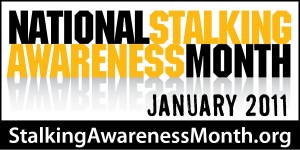 By Devon White
By Devon White
The month of January marks the 8th annual National Stalking Awareness Month (NSAM). This month aims to raise much-needed awareness on stalking and its victims. Because the definition of stalking may vary from state to state, one incident may not be considered criminal, but a series of repeated harassment and threatening behavior is considered a serious offense. According to the NSAM website, stalking is defined as “a course of conduct directed at a specific person that would cause a reasonable person to feel fear. Information provided by the National Center for Victims of Crime (NCVC) reports that there are 3.4 million stalking incidents in the U.S. each year and indicates that stalking victimization has become a rising threat. The U.S. Department of Justice advises that most stalking victims (3 in 4) know their offender, a crime better known as intimate or partner stalking.
According to a study provided by the U.S. Department of Justice, although women are at a higher risk of getting stalked, both “women and men are likely to experience harassment.” Stalking can cause irreparable psychological damage, disruption in employment, and sometimes leads to extreme violence. An estimated 89% of female homicide victims who had been physically assaulted had also been stalked in the 12 months before their murder.
In our technology-driven world, stalking doesn’t end with physical proximity or telephone calls; these days, the harassment exists in the online world of email and social-networking sites and is called “cyber stalking.” With so many ways to be stalked, a victim may not be aware that the threat is a concern until it’s too late.
This month the Women’s Center and the Violence Prevention & Response Project are jointly addressing the issue of stalking victimization. Come check out our table on January 25 with information about stalking: how to deal with it or help a friend deal with it. We’ll also have information about campus and community resources.
Information about National Stalking Awareness Month, stalking facts, recommendations and safety guidelines are available online from the NSAM website. In addition, information on intimate partner and sexual violence is available from the Centers for Disease Control and Prevention.
According to the National Center for Victims of Crime, here are important things you can do if you are being stalked:
- If you are in immediate danger, call 911.
- Trust your instincts and take threats seriously.
- Contact a crisis hotline or victim services agency, like UMKC’s Violence Prevention & Response Project at 816-235-1652.
- Develop a safety plan, including changing your routine.
- Don’t communicate with or respond to the stalker.
- Keep evidence of the stalking.
- Contact the police; every state has stalking laws.
- Consider getting a court order against the stalker.
- Tell family, friends, roommates, and co-workers about the stalking and seek their support.